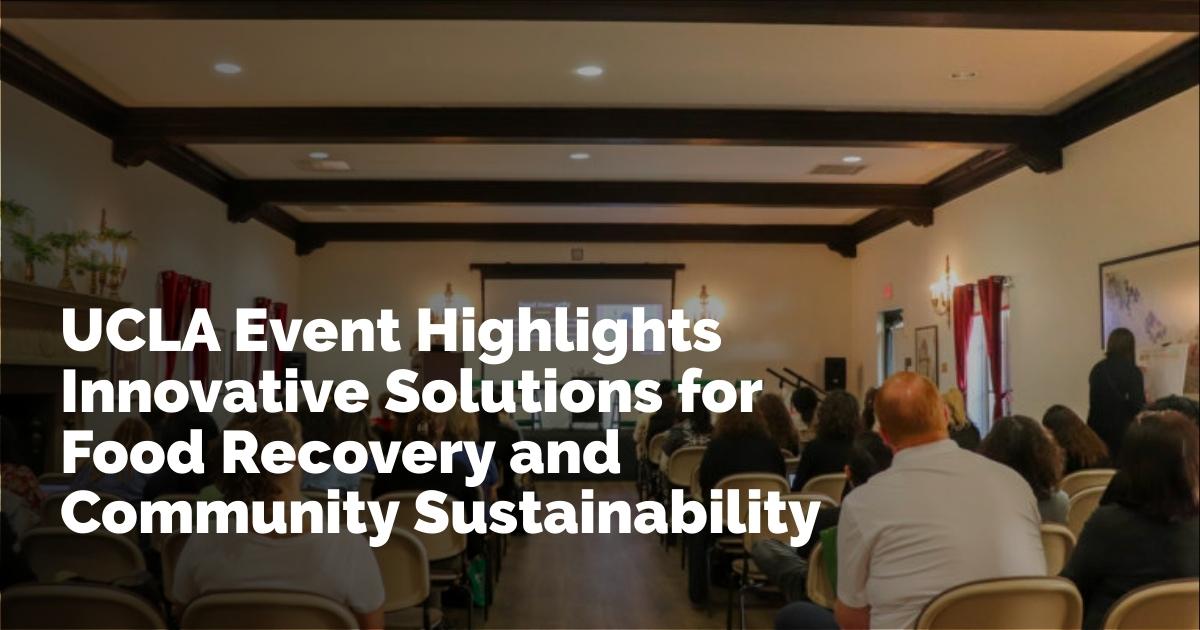Food recovery is an essential topic that has captured the attention of scholars, policymakers, and community organizers, as evidenced by a recent event held at UCLA focused on sustainability solutions. This conference, titled “Closing the Circle 2025: From Excess to Access,” brought together a host of experts, educators, and activists to dissect and discuss food recovery systems. The gathering aimed to explore innovative strategies for minimizing food waste and maximizing food accessibility within communities. Here, we delve into the event's key discussions and insights, highlighting the diverse perspectives and approaches aimed at building a more sustainable future.
Addressing the Challenges in Agriculture and Food Recovery
The event's morning breakout session, “Harvesting Solutions,” was particularly enlightening for those interested in the agricultural sector's role in food recovery. Lisa Johnson from the United States Department of Agriculture and Kristen Johnson from Food Forward, a gleaning organization, spearheaded this session. Gleaning, the process of collecting leftover crops post-harvest, faces notable challenges. Farmers often shy away from donating excess produce due to the net loss incurred by packing and transportation costs. Kristen Johnson argued that providing tax credits or refunds could incentivize farmers to donate their produce rather than letting it go to waste.
“There’s enough food produced to feed the entire United States,” Kristen Johnson remarked, underscoring the importance of incentivizing farmers to participate in food donation programs. Attendee Olivia Fales, with her background in urban agriculture, appreciated the varied perspectives offered during the session, understanding food recovery from both local backyard gardens and national agricultural practices.
Utilizing Food System Data for Community Impact
Kayla de la Haye, an associate professor from USC soon to join UCLA, led an insightful presentation on using food systems data to address food surpluses and community needs. De la Haye focused on the complex web of factors contributing to food and nutritional insecurity. Her presentation highlighted the use of “systems maps,” tools devised to depict local drivers of food insecurity, offering a visual representation of these complex relationships.
Arianna Roberts, a student in mathematics and economics, expressed how impactful it was to see data used in positive, actionable ways to identify geographic disparities in food access within Los Angeles. This approach showcases how mathematical and supposedly objective tools can be leveraged to facilitate social benefits, debunking the myth of data's limitations in social applications.
The Intersection of Food Insecurity and Health
Food insecurity is intrinsically tied to chronic health conditions, a point that resonated with many attendees, including Tanisha Gunby, a UCLA alumnus interested in health fields. She and other participants found the discussions around health and food systems particularly compelling, reinforcing the need to address food insecurity as a preventive measure for various health issues.
Alba Velasquez, the executive director of the LA Food Policy Council, discussed how food systems offer opportunities across several domains, including environmental sustainability, economic development, and public health. The diverse opportunities for involvement illustrate the multifaceted nature of food systems and their widespread impact.
Building a Collaborative Community for Enhanced Food Systems
Collaboration and partnerships were recurring themes throughout the conference, emphasized by organizational voices like Elias Jabbe. Jabbe, having been a recent fellow at the UCLA Center for Developing Leadership in Science, advocated for continued engagement with conferences and networking as critical components for students pursuing careers in food systems.
Elias underscored that the essence of the conference was to break down silos, share best practices, and foster relationships for future collaborations. The mission is clear: stimulate collaboration that integrates diverse expertise and perspectives to innovate food recovery solutions.
Student Involvement in Food Initiatives
The event highlighted how student involvement is crucial in advancing food issues on campus. Leon Lavong, a physiological science student, found that volunteering at the event enriched his understanding of personal and professional aspects of food sustainability. His aspirations to integrate food and medicine in his future career reflect the increasingly recognized intersection of these fields.
Another student volunteer, Lumina Chan, an intern with the Rothman Family Institute for Food Studies, expressed gratitude for the opportunities to connect with experts, reinforcing her commitment to a career in food and nutrition.
Strengthening Campus Networks for Food Recovery
Erica Lee from the Rothman Family Institute for Food Studies pointed out various student-led food recovery initiatives, such as Bruin Dine, that enable students at UCLA to engage with these sustainability efforts. These initiatives provide platforms for students to turn theoretical knowledge into practical action, ensuring they contribute meaningful solutions to food sustainability challenges.
The conference served not merely as a ground for discussion but as a planting ground for ideas that will hopefully grow into actionable food recovery solutions. The collective energy and shared commitment of participants highlighted the potential to drastically improve food systems by harnessing collaboration, data-driven decision-making, and community involvement.
출처 : Original Source

